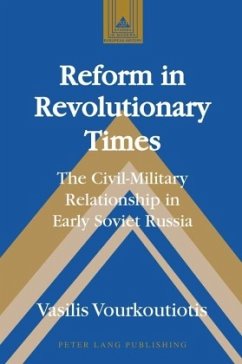How does a state effectively mobilize its citizens for armed conflict? Why do citizens allow themselves to be placed in harm's way? The military relationship between the state and its citizens, in terms of rights and obligations, remains as important today as it did when Europe first moved from under the shadow of the Ancien Régime. Reform in Revolutionary Times explores the evolution of the civil-military relationship during one of the more unique periods of modern European history. Born through revolution during the First World War, the Soviet state was plunged immediately into a civil war which included foreign intervention by American, British, French, Japanese, and Czech soldiers. The fires had not yet been extinguished when conflict with Poland further threatened its existence. Pragmatism vied with ideology, as the Soviets mobilized the population to unheard of levels through fundamental reforms, simply to survive these early years of revolution and war.








